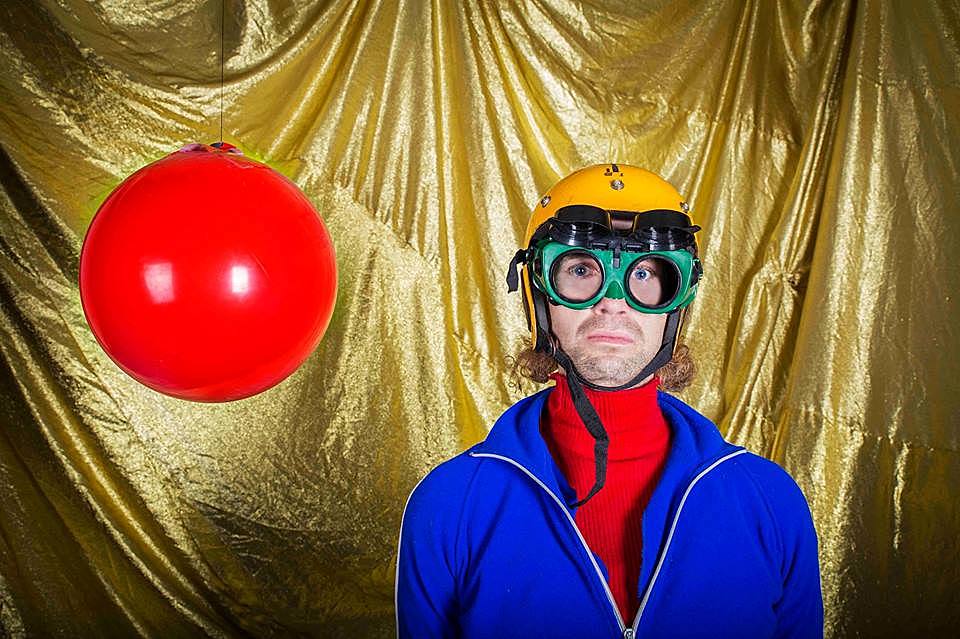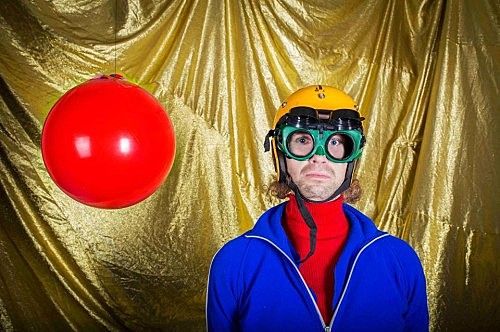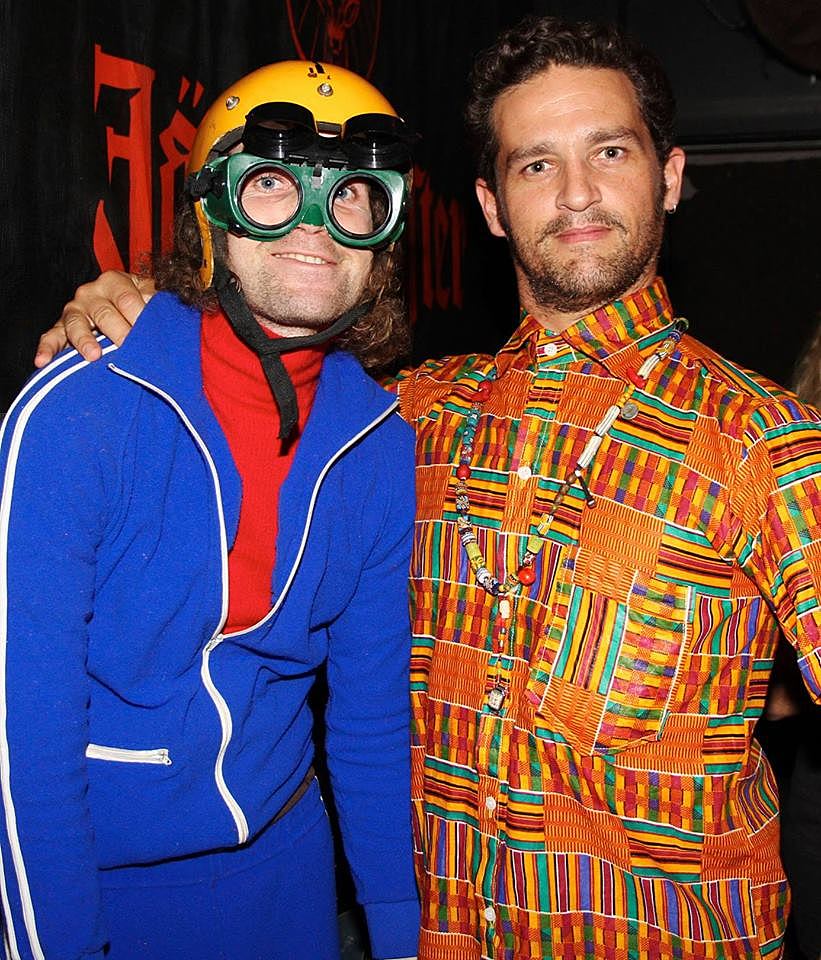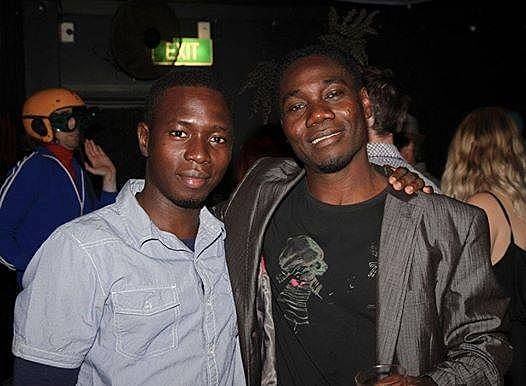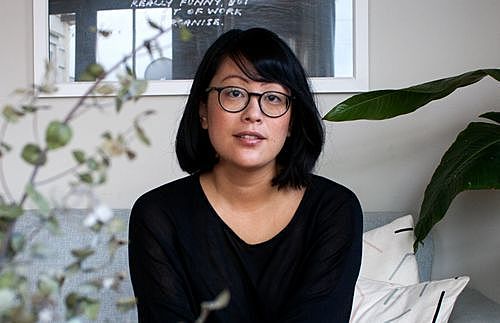Martians, Clowns and Giant Moas: In Rehearsal with Ollie Cox and Barnie Duncan
Ollie is a Martian is a wonderfully silly and unexpectedly poignant one-man show, devised by Oliver Cox and his uncle (and performer extraordinaire) Barnie Duncan. Ahead of their opening, Rosabel Tan chats to them about clown school, being an alien, and giant moas.
“I am the master of technology,” whispers 29-year-old Ollie Cox to an invisible audience. He’s rehearsing his one-man show Ollie is A Martian in the Dojo space, a third-floor room hanging between Basement and Q. “Yessss,” he drawls with disconcerting glee. He nudges the bright blue moon hopper at his feet, sending it bobbing across the stage and him shuffling after it. “Yessss.” With each self-affirmation he sounds more and more like a deranged child. “Yaiiiss.”
After a fumbling chase, he finally wedges it between his legs. His voice switches to a stern, emotionless countdown – 3, 2, 1 – and then he’s floating through space. He takes in the sights, his gaping mouth the only thing visible underneath his cracked goggles. He’s rapt. He’s marvellous.
“That’s awesome, Ollie,” calls Barnie Duncan – his uncle and director of the show – from the side of the room. “But you’re going to have to work harder than that.” He strides over and demonstrates how he thinks the physical aspects of the flying scene could be improved, bouncing in slow-motion with the moon hopper between his legs. Ollie mimics him. It’s like watching a half-speed aerobic class between two grown men who have never been to aerobics. “You feel that?” Barnie asks Ollie. “It’s very thigh-y.”
They do the scene a few more times. “I might take this home tonight,” Ollie says at the end, clutching the moonhopper sheepishly. It’s a week before their opening night and they’ve just completed their first run-through. It’s given them both the fear.
They’ve been developing and rehearsing the show for just over a year now. “I had the idea on New Year’s Eve,” explains Barnie, “then I told Ollie one night when his dad – my brother - lived on Waiheke Island and I was staying over there. And I said, ‘I had this idea. You should be a Martian and we should make a show about it.’ We started booking half a Monday at the Old Folks Ass. Doing it real gentle, just half a day, once a week. It was a good start.”
Over the next few months they devised it together, creating half-page episodes incorporating physical comedy and lyrical observation that would eventually be strung into a whole. They started with the costume: electric blue tracksuit, silver fanny pack, bright yellow helmet, broken goggles and heavy dusty moonboots. Paired with Ollie’s long frizzy hair and his clowning background, it’s a wonderfully absurd sight to behold onstage. At one point during rehearsals, Barnie murmurs that that question is whether Ollie is a Martian or a lunatic who thinks he’s a Martian.
“He is an odd one,” Ollie says of his character, an alien who’s just arrived on Earth, “but he doesn’t think he’s very much. He knows he’s different from Earthlings but he’s discovering similarities along the way. He doesn’t know what brought him here or why he’s there.”
“The good moment for me,” Barnie says, “was when I asked you about when you’d felt alien-y at school.” Ollie nods.
“They pulled me out of third form at Wellington High School – which is a great school by the way. They pulled me out to go to special needs. And at the time I was like: why am I here? There was a kid with cerebral palsy – I mean, I’d been told when I was a kid that I had mild cerebral palsy, but it was never diagnosed by anyone – there were people who couldn’t speak. All sorts of things. People with anger issues. All sorts of different things and so – I always knew I had reading problems, or probably wasn’t learning as fast as other people were, so I went there, but I didn’t understand why I was there.”
The special needs department at Wellington High School was situated next to the drama department, and following a restructuring of the curricular requirements Ollie was allowed to enrol in a drama class. “It was a way for me to get out of myself,” he comments. “To get out of my own world. That’s how I perceived acting at that time.”
There’s poetry in the cyclical way theatre’s function has evolved for him over the years, from representing a way to escape the world to providing him with a way to re-enter it as himself. After high school, he attended the Wellington Performing Arts Centre, where he did two years of acting and a year of musical theatre. He was then accepted into École Philippe Gaulier, the prestigious French clown school whose alumni include Fred Award winner Trygve Wakenshaw, Emma Thompson and Sacha Baron Cohen.
Gaulier’s approach to teaching focuses on helping his students discover their own voice. In an interview with The Telegraph, he emphasised that he didn’t teach a particular style. “People have to find a way of being beautiful and surprising,” he said. On his website he writes: “Why dirty the soul of students by slyly fobbing them off with the style of others, imprisoning them in alien formats?”
“He’s very much about seeing you onstage,” agrees Ollie, “which is a lot harder than it sounds. To be you on stage.” He’s also a hard ass. “He would call you out and say ‘I do not want to see this shit character. I want to see you. I want to see your beauty.’ It’s really truthful. It wasn’t like when you go to drama school. There, they put you down and then they build you up. It wasn’t like that. It was honest.”
He wouldn’t call Ollie is a Martian a clown show, though. “Bits of it are clown. Bits of it I am a little bit- ”
Barnie nods. “I think it’s hard for you not to be.”
“The clown is funny when he’s in the shit,” Ollie explains. “When he’s got a problem. When he’s at his most vulnerable. And that’s when it’s most beautiful because you have to-” he trails off, picks up halfway through another sentence – “A lot of people can relate to clown because clown is a part of everyone.”
“It’s about being vulnerable and being helpless,” Barnie agrees. “And often when we feel that way we try to grab our character shields back, but a clown says: I’m nude.” It’s this vulnerability that’s felt in Ollie’s performance: it’s him onstage: his reactions, his name in the title, his way of processing and interacting with the world. It’s also in the way he talks about his life: he has a deadpan delivery that’s occasionally accompanied by raucous, almost maniacal laughter. He’s humble and playful. He knows who he is, and he doesn’t take it too seriously.
“I’ve had a couple of strange jobs,” he tells me when I ask what else he’s been working on. “I was a giant moa for Kip Chapman.” He seems unaware of how strange this sentence sounds. “I did that a couple of times. It was my first puppetry experience, I guess. I was inside this huge bird.
“Was it for a play?” I ask. Ollie shakes his head.
“Wasn’t it in a zoo or something?” Barnie offers.
“No.” He squints, trying to remember the details. “It was just in town, on Queen St. I just had to wander around. There was another guy with me in gumboots and a hat. He was like my minder. I had to give away a form for something, and I had to interact – I had to go into shops and - I wouldn’t try to steal anything, but I tried to put on a dress.”
It’s an absurd and silly image, as much in the content as it is in the telling, and it’s this quality – and his awareness of it – that lies at the heart of Ollie is a Martian. “I process things differently to other people,” he mentions at one point in our conversation, and when I ask him how he knows this, the question seems to surprise him. “I guess I assume everyone has a different way of getting across what they want to say.” It's this sentiment that seems to form the heart of Ollie is a Martian, too: the value in recognising who we are, devoid of pretence or ego or fear, and how we can use this to discover our own way to be beautiful, vulnerable and surprising.
Ollie is a Martian plays at Basement theatre from 3 – 7 June, 7pm
Tickets available through iTicket
